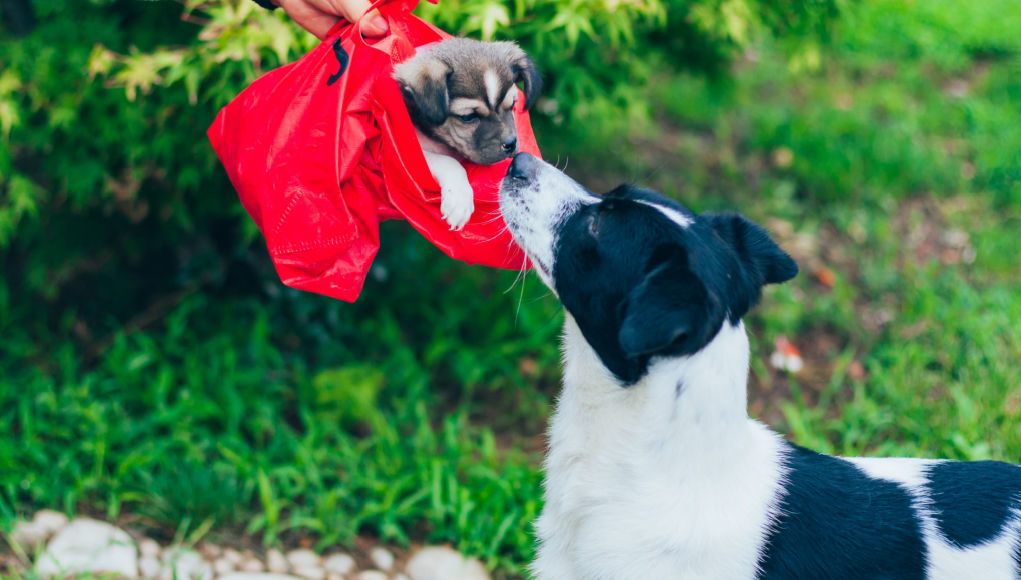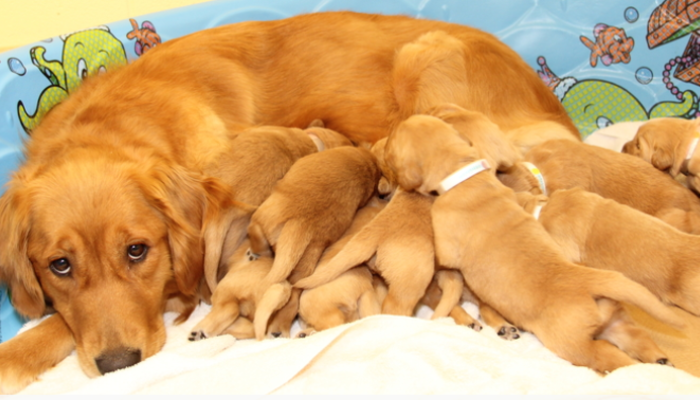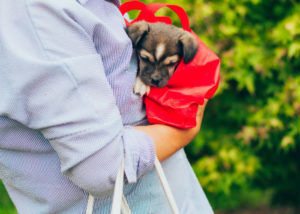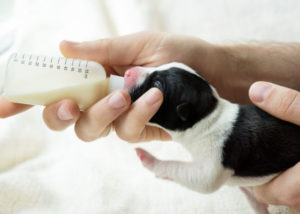Table of Contents
- Separating Puppies from Mothers Too Early: Why is it Bad?
- Separating Puppies from Mothers Too Early: Why It Could Be Important
- How to Care for a Pup Separated Too Early from Mother
- Benefits of Having a Well-Raised Puppy (One that's Not Separated from its Mama Too Early!)
- Best Time to Separate Puppies from Their Mothers
- Separating Puppies from Mothers Too Early—Summary
Separating puppies from their mothers is mostly an uneventful thing—puppies get adopted all the time, after all.
But part of being a responsible dog parent is knowing when to start caring for them and when to, well, just let them be under their mother’s care.
Because separating pups from their mothers and littermates too early has consequences for both the mother’s and the youngster’s health and wellbeing.
It may also cause you, the adoptive fur parent, more trouble than good.
That is why we must learn the when, the how, and the why of separating puppies.
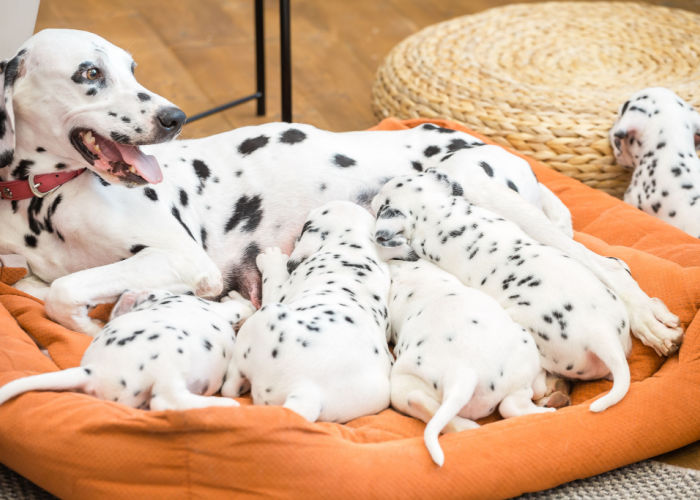
Separating Puppies from Mothers Too Early: Why is it Bad?
There are consequences to separating pups from their mothers too soon.
Making them leave before they are fully ready will definitely cause some serious concerns over their physical, emotional, behavioral, and psychological well-being.
In fact, experts say that early separation is the most common reason why pups develop behavioral and physical problems later on in life.
Nutritional Deficiency
Every mama's milk contains vital nutrients that her baby needs—be it for babies or pups alike.
Puppies won't get the vitamins, minerals, enzymes, and antibodies that they can only get from their mama dog's milk if they are separated too early.
Chances are the pup will have a decreased appetite and less weight gain as it matures (take note that pups should gain 5% to 10% of their weight each day!)
Sickly Pups
Without the nutrients and antibodies that they need from their mama's milk, pups that are separated too early are more prone to getting different diseases.
They are most likely to have a poor immune system, making them more susceptible to getting sick.
Apart from the milk, mama dogs also provide their pups with warmth.
Without it, they may be hypothermic (low body temperature), hypoglycemic (low blood sugar level), and dehydrated.
Incontinence
Just like our own mamas when we were little, mama dogs also help their little ones go potty!
Without this assistance from the mother, the pup may have difficulty urinating or defecating. It may be constipated or have a ruptured bladder.
Also, incontinence could be a sign of separation anxiety.
These pups, even when they have already been housebroken, still have difficulty in control, causing liquid and solid accidents.
Separation Anxiety
Pups that have been separated before they're ready also develop fear, distress, and impaired learning.
They have high levels of stress and anxiety manifested through irregular sleeping patterns, unexplained midnight whining, pacing, and even destruction.
Aggression
One common behavioral problem because of early separation from their mothers is a pup's aggression toward other people or animals.
They tend to distrust strangers quite easily; they're prone to be nervous with a tendency to bark and bite.
Difficult to Discipline
Because pups that are separated too early didn't get to experience much of competing with their siblings for mama's milk, they are likely to have a hard time tolerating frustration.
They also exhibit inappropriate play biting because they didn't learn from their mama dogs what's okay and what's too much.
Because of the lack of social skills they should've learned from their litter, these pups are more difficult to discipline and train compared to others.
Death
Some people claim that removing the pups early from their mother’s care will increase their capability to bond with humans.
However, research published in The Journal of the South African Veterinary Association debunked this theory.
They said the psychological and emotional stress it takes for dogs is far greater than the possibility of easier human socialization.
The research also claimed that there is a higher mortality rate among pups that are separated from their mother and litter before reaching 12 weeks of age.
Since they can be more prone to diseases, the possibility to die early is higher for pups with shorter maternal contact.
Separating Puppies from Mothers Too Early: Why It Could Be Important
Mama dogs sometimes reject their pups for a couple of reasons.
That's why there are special circumstances when it is a must to separate the moms from their pups at the soonest time possible.
Unwell Pups
Some puppies are born with different needs than their siblings. They may have a physical defect or are naturally born weak.
Since it is part of a mama dog’s instinct (or every animal’s instinct especially in the wild, for that matter!) to leave behind offspring that they feel will not survive, a mother may reject her pup in an instant.
She may leave it behind, or not give much attention to it unlike she does with the other offspring.
Unwell Mother
The mother may also be experiencing some pain or discomfort after giving birth.
She may be distressed because she can't produce enough milk to sustain all her pups.
Mama dogs before or after giving birth may also contract an infectious disease that could be fatal not only for her but for her newborn pups.
While it is ideal to feed the newborn with breast milk from their mamas, it's also possible to pass on whatever infection she may have gotten to her pups through close proximity, or through her natural milk.
Stressed Mother
Some mother dogs are not necessarily sick physically.
However, it's possible that they are psychologically unwell to meet their puppies' needs.
The usual cause of this is stress or trauma from her past experiences.
You can tell that a mother is stressed or traumatized if she does not make any attempt to nurse or care for the pups, but instead neglect them, attack them, or worse, kill them.
This is most common for first-time mothers.
In these scenarios, it's best to intervene the sooner, the better to make sure that both mother and pup are given the care they need.
How to Care for a Pup Separated Too Early from Mother
Separation during infancy
In case it becomes necessary to take away the pups from the mother, caring for them now falls upon you.
If the separation has to be done at the nursing stage, buying artificial puppy milk formula is needed to bottle-feed them.
Just remember to check how to properly prepare the formula because too much water or too little may have a bad effect on them.
You will also have to guide them through their weaning stage usually at their 3rd or 4th week of age.
Slowly introduce soft, solid food into their diet by mixing in puppy dry food mixed with warm water or warm puppy milk.
The gruel should have an oatmeal-like consistency so the pups can eat them easily.
After a week or so, you may start adding more dry food into the gruel until they can fully ingest it.
This whole transition should take about 2 to 3 weeks.
By 5 to 6 weeks, they will need to learn to socialize. If they are still together with their littermates, this might help stimulate their physical and mental skills.
Pups, especially orphaned ones, have to be slowly introduced to new animals and people.
You as their dog owner will have to supervise them to make up for lost socialization lessons from their mother.
Remember that you can always consult with your trusted vet to make sure you are doing the proper steps in taking care of puppies in the absence of their mother.
Separation at a couple of weeks old
If the puppy was able to at least nurse from the mother before they get separated, it may now be exhibiting some issues attitude-wise.
Good thing that there are still remedial ways you can do to relieve its anxiety.
To start off on a good footing, it's best to have a dog trainer evaluate your puppy.
If possible, why not enroll it in puppy classes to help it adapt to its new environment?
At home, make sure that you, as the owner, assume a strong leadership role.
It's important to let them know that they need to conform to your rules, and not the other way around.
Giving them constant and ongoing training will help puppies outgrow the behavioral issue they developed because of getting separated from their mama dogs too soon.
Benefits of Having a Well-Raised Puppy (One that's Not Separated from its Mama Too Early!)
Imprinting is one of the important things a newborn puppy goes through.
It is a necessary part of a dog’s development and proper growth because after all, imprinting is their first experience of socialization.
Below are the positive attributes a pup gets when raised properly by its mama until the right age:
They learn to live with others
As newborns slowly begin to explore their surroundings, they also get to be familiar with the presence of their siblings.
The pups get used to seeing other dogs and interacting with them.
They also learn how to be sociable and tolerant of others at the very least.
They know how to behave
Because mothers teach their youngsters important social cues, pups will learn how to behave properly.
Mama dogs will teach them what is acceptable and what is not.
If they keep being naughty, they will surely be chastised by their mamas!
They will grow healthy
It is important for a puppy, especially in its early stages to feed breast milk from its mama.
Apart from keeping them full, breast milk will also help them fight off malnutrition and other ailments that they may possibly experience otherwise.
They learn to control themselves
As a pup learns to play with its siblings, it will also learn how to socialize properly—which means no excessive use of force and strength!
Through this, they learn to control themselves, especially their natural weapons like claws and fangs.
They grow into affectionate furballs
Because they will grow and mature from the love of their mama, pups that are properly cared for also grow up to be affectionate and loving dogs.
Establishing their relationship with their mama and siblings also plays a key role in training them and grooming them to be the best dogs they can be.
Best Time to Separate Puppies from Their Mothers
In essence, as long as the puppy knows how to wean (a.k.a. eat semi to fully solid food), it may be independent enough to leave its mother’s nest.
This typically happens around their 6th week. However, that is the bare minimum.
There are laws and administrative regulations across the country that allow 8-week-old pups to be separated from their mother and litter.
But veterinary experts say that it may still be a little early for the pups to properly get the benefits of being completely cared for by their mothers.
Many ethologists said the best time to separate pups from their mothers is actually at 12 weeks or 3 months.
Some experts even advise letting puppies stay with their mothers for as long as they can.
In this way, they will be somehow well-prepared to welcome all the changes in their surroundings and at the same time welcome their forever home.
Separating Puppies from Mothers Too Early—Summary
Separating puppies from their mothers had to be done at some point—but not too early!
I know how exciting it is to adopt a new puppy. But know that taking them too early under their mama dog's care can potentially bring more trouble than good.
Just remember that separating the pups from their mother is a process.
Try to follow it with no skipped steps as much as you can. This will make sure that they are fully ready to be independent.
Another important thing is what comes after the separation.
This means the love and the patience you as their new owner will give them as they slowly adjust to their new life as the newest member of your family.


